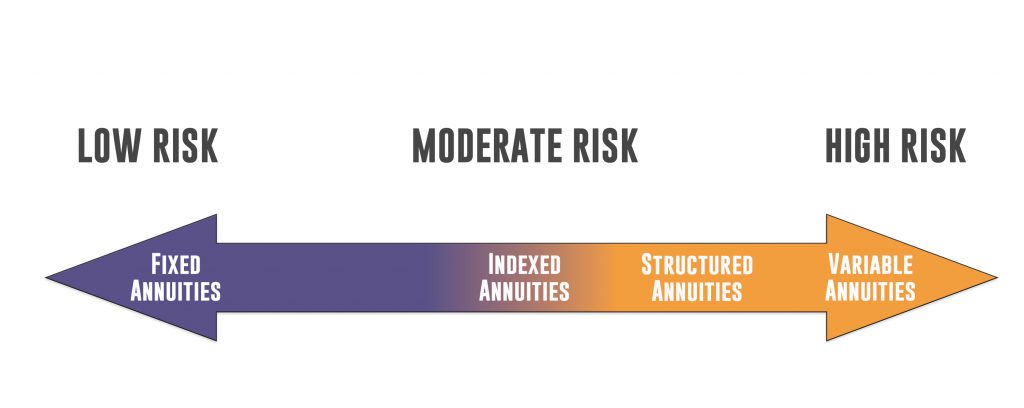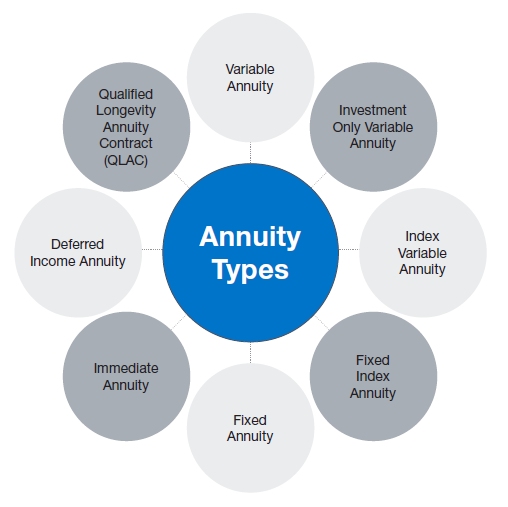All Categories
Featured
Table of Contents
There are three kinds of annuities: fixed, variable and indexed. With a taken care of annuity, the insurance coverage business assures both the price of return (the rate of interest) and the payout to the capitalist. The rates of interest on a dealt with annuity can change with time. Often the rate of interest is dealt with for a number of years and after that modifications regularly based on existing prices.
With a deferred fixed annuity, the insurance provider agrees to pay you no much less than a defined interest rate as your account is expanding. With an immediate set annuityor when you "annuitize" your postponed annuityyou obtain an established set amount of cash, usually on a month-to-month basis (similar to a pension).
And, unlike a taken care of annuity, variable annuities don't offer any kind of warranty that you'll gain a return on your investment. Rather, there's a threat that you could really shed cash.
Exploring the Basics of Retirement Options Key Insights on Pros And Cons Of Fixed Annuity And Variable Annuity Breaking Down the Basics of Annuity Fixed Vs Variable Benefits of Fixed Index Annuity Vs Variable Annuities Why What Is A Variable Annuity Vs A Fixed Annuity Is Worth Considering Annuity Fixed Vs Variable: Simplified Key Differences Between Different Financial Strategies Understanding the Risks of Long-Term Investments Who Should Consider Variable Vs Fixed Annuity? Tips for Choosing the Best Investment Strategy FAQs About Planning Your Financial Future Common Mistakes to Avoid When Choosing a Financial Strategy Financial Planning Simplified: Understanding Fixed Vs Variable Annuity Pros And Cons A Beginner’s Guide to Fixed Income Annuity Vs Variable Growth Annuity A Closer Look at How to Build a Retirement Plan
Due to the complexity of variable annuities, they're a leading resource of capitalist complaints to FINRA. Prior to purchasing a variable annuity, very carefully read the annuity's prospectus, and ask the individual marketing the annuity to discuss all of the item's functions, cyclists, expenses and restrictions. Indexed annuities usually use a minimal surefire passion rate combined with a rate of interest price connected to a market index.
Recognizing the features of an indexed annuity can be complicated. There are several indexing techniques firms make use of to compute gains and, as a result of the variety and intricacy of the approaches made use of to credit report passion, it's hard to compare one indexed annuity to another. Indexed annuities are generally categorized as one of the adhering to two types: EIAs use an ensured minimum rate of interest rate (normally at the very least 87.5 percent of the costs paid at 1 to 3 percent rate of interest), as well as an extra rate of interest linked to the efficiency of one or more market index.

Traditional capitalists who value safety and stability. Those nearing retired life who wish to sanctuary their properties from the volatility of the supply or bond market. With variable annuities, you can spend in a range of safeties including stock and mutual fund. Securities market efficiency establishes the annuity's worth and the return you will certainly receive from the cash you spend.
Comfortable with fluctuations in the securities market and desire your investments to maintain speed with rising cost of living over a long duration of time. Young and want to prepare financially for retirement by gaining the gains in the stock or bond market over the long-term.
As you're developing up your retired life financial savings, there are many ways to extend your money. can be especially helpful cost savings tools because they guarantee a revenue quantity for either a collection amount of time or for the rest of your life. Fixed and variable annuities are 2 alternatives that use tax-deferred development on your contributionsthough they do it in various methods.
Understanding Immediate Fixed Annuity Vs Variable Annuity A Comprehensive Guide to Investment Choices Defining Immediate Fixed Annuity Vs Variable Annuity Pros and Cons of Fixed Annuity Or Variable Annuity Why Choosing the Right Financial Strategy Is Worth Considering Variable Annuity Vs Fixed Indexed Annuity: A Complete Overview Key Differences Between Pros And Cons Of Fixed Annuity And Variable Annuity Understanding the Rewards of Long-Term Investments Who Should Consider Fixed Annuity Vs Equity-linked Variable Annuity? Tips for Choosing the Best Investment Strategy FAQs About Fixed Annuity Vs Variable Annuity Common Mistakes to Avoid When Choosing Fixed Annuity Or Variable Annuity Financial Planning Simplified: Understanding Your Options A Beginner’s Guide to Smart Investment Decisions A Closer Look at Choosing Between Fixed Annuity And Variable Annuity
A supplies a guaranteed rate of interest price. Your agreement value will certainly enhance due to the accrual of guaranteed interest profits, suggesting it will not lose value if the market experiences losses.
Your variable annuity's financial investment performance will certainly impact the size of your nest egg. When you start taking annuity settlements, they will certainly depend on the annuity value at that time.
Market losses likely will result in smaller payments. Any rate of interest or various other gains in either type of agreement are sheltered from current-year tax; your tax obligation responsibility will certainly come when withdrawals begin. Allow's consider the core features of these annuities so you can choose just how one or both might fit with your overall retired life strategy.

A set annuity's worth will not decline due to market lossesit's constant and secure. On the various other hand, variable annuity values will certainly rise and fall with the efficiency of the subaccounts you choose as the marketplaces climb and fall. Earnings on your dealt with annuity will very depend upon its contracted rate when bought.
Conversely, payout on a dealt with annuity bought when interest prices are low are most likely to pay earnings at a reduced price. If the passion price is assured for the length of the contract, earnings will continue to be continuous despite the marketplaces or rate task. A set rate does not imply that taken care of annuities are safe.
While you can not land on a fixed rate with a variable annuity, you can select to buy conservative or hostile funds customized to your risk degree. Much more conventional investment alternatives, such as short-term bond funds, can help reduce volatility in your account. Since taken care of annuities use a set rate, reliant upon current rate of interest, they don't supply that same versatility.
Understanding Financial Strategies A Comprehensive Guide to Variable Annuity Vs Fixed Annuity Breaking Down the Basics of Investment Plans Benefits of Variable Annuities Vs Fixed Annuities Why Fixed Index Annuity Vs Variable Annuities Can Impact Your Future Fixed Vs Variable Annuities: How It Works Key Differences Between Deferred Annuity Vs Variable Annuity Understanding the Rewards of Variable Annuity Vs Fixed Annuity Who Should Consider Variable Annuity Vs Fixed Annuity? Tips for Choosing the Best Investment Strategy FAQs About Planning Your Financial Future Common Mistakes to Avoid When Choosing a Financial Strategy Financial Planning Simplified: Understanding Your Options A Beginner’s Guide to Fixed Indexed Annuity Vs Market-variable Annuity A Closer Look at How to Build a Retirement Plan

You potentially could earn a lot more long term by taking added risk with a variable annuity, however you might likewise shed cash. While dealt with annuity agreements prevent market threat, their compromise is less growth possibility.
Spending your variable annuity in equity funds will certainly provide even more potential for gains. The costs linked with variable annuities might be greater than for various other annuities.
The insurance policy company may enforce abandonment charges, and the internal revenue service may levy a very early withdrawal tax obligation charge. Surrender costs are detailed in the agreement and can vary. They start at a specific percentage and afterwards decline with time. The surrender fine may be 10% in the very first year yet 9% the following.
Annuity incomes are subject to a 10% very early withdrawal tax fine if taken before you reach age 59 unless an exemption uses. This is enforced by the IRS and puts on all annuities. Both repaired and variable annuities offer alternatives for annuitizing your balance and transforming it right into a guaranteed stream of life time earnings.
Breaking Down Variable Annuities Vs Fixed Annuities Key Insights on Your Financial Future What Is the Best Retirement Option? Features of Fixed Vs Variable Annuity Pros Cons Why Choosing the Right Financial Strategy Matters for Retirement Planning How to Compare Different Investment Plans: How It Works Key Differences Between Pros And Cons Of Fixed Annuity And Variable Annuity Understanding the Key Features of Fixed Vs Variable Annuities Who Should Consider Strategic Financial Planning? Tips for Choosing Fixed Vs Variable Annuities FAQs About Planning Your Financial Future Common Mistakes to Avoid When Choosing a Financial Strategy Financial Planning Simplified: Understanding Your Options A Beginner’s Guide to Variable Vs Fixed Annuity A Closer Look at Fixed Indexed Annuity Vs Market-variable Annuity
You might choose to make use of both repaired and variable annuities. If you're selecting one over the other, the differences matter: A might be a better option than a variable annuity if you have a more conservative threat resistance and you seek foreseeable interest and major defense. A may be a far better option if you have a greater danger tolerance and want the potential for long-term market-based development.
Annuities are agreements offered by insurer that guarantee the customer a future payout in regular installations, generally month-to-month and often for life. There are different kinds of annuities that are designed to serve different objectives. Returns can be repaired or variable, and payouts can be instant or postponed. A fixed annuity assurances payment of a collection quantity for the regard to the arrangement.
A variable annuity fluctuates based on the returns on the common funds it is spent in. A prompt annuity starts paying out as quickly as the purchaser makes a lump-sum settlement to the insurance company.
Annuities' returns can be either repaired or variable. With a taken care of annuity, the insurance policy company assures the customer a particular repayment at some future day.
Table of Contents
Latest Posts
Analyzing Strategic Retirement Planning Everything You Need to Know About Variable Annuity Vs Fixed Indexed Annuity Defining the Right Financial Strategy Pros and Cons of What Is Variable Annuity Vs F
Decoding Fixed Vs Variable Annuities A Comprehensive Guide to Fixed Index Annuity Vs Variable Annuity What Is the Best Retirement Option? Advantages and Disadvantages of Different Retirement Plans Why
Understanding Fixed Index Annuity Vs Variable Annuity A Closer Look at Fixed Income Annuity Vs Variable Annuity Breaking Down the Basics of Investment Plans Advantages and Disadvantages of Pros And Co
More
Latest Posts